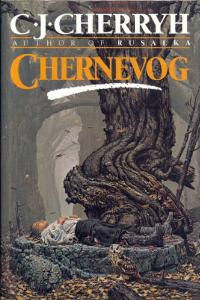Plot summary
Chernevog begins three years after the conclusion of Rusalka . Sasha, Pyetr and Eveshka are living in Uulamets' cottage; Sasha is 18 and a young wizard, and Pyetr and Eveshka are married. Chernevog is still asleep in the forest, guarded by the leshys [a] , but Sasha and Eveshka have disturbing dreams about him waking up. One day Sasha and Pyetr find that Eveshka has disappeared, and they set off to find her. They suspect that she may have gone to confront Chernevog, who still controls their lives.
Sasha and Pyetr travel into the forest and find Chernevog still asleep. Pyetr tries to kill him once and for all, but an owl, a childhood friend of Chernevog's whom he gave his heart to, attacks Pyetr. Pyetr kills the owl and Chernevog regains his heart, which wakes him up. Chernevog had given away his heart to free his conscience, enabling him to practise magic freely. Sasha has learnt that Chernevog had rejected Uulamets' teachings of wizardry, which works within nature and considers the consequences of wishes, and turned to magic, which taps dark forces and is not concerned with laws of nature. Pyetr tries to kill Chernevog again, but Sasha stops him. With his heart, Chernevog's actions are limited and Sasha is able to control him. Sasha and Pyetr resume their search for Eveshka, taking Chernevog with them.
Eveshka's reason for fleeing the house is because she knows Chernevog will wake up and she fears for their safety. She is drawn to a house occupied by her mother, Draga, whom Chernevog and murdered after he had had Eveshka killed. Draga and Uulamets had met when they were both under the tutelage of a wizard named Malenkova, but Uulamets feared her and ran away. Draga killed the wizard, and later, pregnant, arrived at Uulamets' cottage to give birth to Eveshka. Uulamets took Eveshka away from Draga, and fearing for her life, she ran away, leaving Uulamets the task of bringing up and controlling a "doubly gifted" wizard. Draga then found Chernevog, an abandoned child who had been abused by another wizard, and took him in. Chernevog was wild and appeared possessed, but she controlled and manipulated him, then sent him to Uulamets to be his student. Chernevog hated Uulamets and had killed Eveshka to revenge him. Chernevog then, using his new-found skills, hunted down and killed Draga. Over the years Draga, as a ghost, slowly willed herself back to life, intent on revenging her murder.
After days looking for Eveshka, Sasha drops his guard and Chernevog sends his heart to Pyetr, allowing him to freely practise magic again. In control of both Sasha and Pyetr, Chernevog directs the search for Eveshka, hoping to find her before she finds Draga, whom he knows is alive again. Draga needs Eveshka's help in overcoming Chernevog and tells her that she is pregnant with Pyetr's child. She also persuades Eveshka to start using magic. Draga had inherited magical wolves from Malenkova and she divides Eveshka's consciousness amongst them, increasing her power. When Chernevog, Sasha and Pyetr arrive at Draga's house, the wolves threaten to overwhelm Chernevog. Realizing that he cannot defeat Draga and Eveshka's magic, Chernevog retreats and the wolves and Draga follow. When they reach a nearby hill, Chernevog calls down a lightning strike that kills him, Draga and the wolves. This frees Pyetr of Chernevog's heart and Eveshka from the wolves and Draga's control.
Pyetr, Eveshka and Sasha return to their cottage where Eveshka gives birth to a daughter. But she is worried about bringing up a wizard child, knowing what it might do to them, and especially Pyetr, if it does not get its way.
